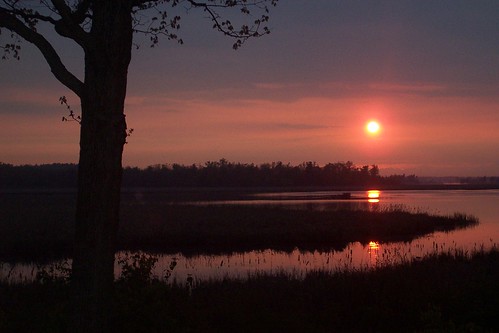In the early nineties, I had a chance to meet David Brower, the famous environmentalist. I remember asking him: how do we get people to care about what we are doing to the earth? What motivates people to become environmental activists?
His theory was that caring for the earth began with love of place, that caring for a landscape led to caring for other landscapes, other creatures, and something larger than ourselves.
Here is a place I love, the marsh I've known since childhood. For me, the photo is no generic sunset but a familiar scene I know intimately. I recognize the line of cattails, the oak tree to the left, the island in the distance. My parents own land at the edge of this marsh, and we all bring tents and camp here whenever we can, all summer long. No matter how many times I watch the sun set over this bay, the calm water turning first silvery, then dark, then smeared in big joyful smudges all over with red, I still feel overwhelmed and humbled.
Some members of the family will scurry about, getting wood for the campfire and sticks for roasting marshmellows, but I tend to just stand at the end of the dock and stare. Sometimes some of us will take out the canoes -- or the sailboat perhaps -- and paddle out into all that brilliant colour.
April 22, 2005
Photo for Earth Day
Subscribe to:
Post Comments (Atom)


12 comments:
Fantastic.
Absolutely amazing! I admit that it's harder to appreciate the earth when you're surrounded by concrete. I try to appreciate the little things. I do wish I had a view like that though.
What a beautiful photo.
You have the best photos!
Beautiful!
It is wonderful thinking about the connection to place, especially when you've lived in one long enough to think of it as home.
When I think about it, a lot of my thoughts as a scholar (and in general) have been about a related question: how do we get people to _develop_ that sense of home? Especially if they are members of a society that takes geographic mobility as the norm? How do we learn to set down roots while not trampling over the essential character of the new place?
I am envious. We love to camp and the idea of camping there is thrilling. Beautiful photo
What a lovely place to return to. I like the imagery of all these people scurrying and staring at things!
On a side note, and since you rightly and passionately discuss the power place has on all aspects of our lives (and how you've never lived more than 9 miles from the spot you were born--forgive me if I'm misrepresenting this), I'm curious to know if there is any significance to your use of British rules of spelling? Is that a regionalism left over from the Colonial period?
Dr. M: No, most people in this area don't use the British spellings. I do because I grew up loving British literature -- that is actually what my degree is in, even though I teach American literature. (I have never taught anything I read in grad school.) I spent a semester in London as a college student and that became the first city I ever fell in love with. At one time, my little sister and I agreed that we would always use the British spellings because they looked better. We also agreed to always spell the word grey with an e.
Rana: That's a question I've thought about as well. It's one of the reasons I began teaching urban nature literature. The majority of the peopple in this country live in urban areas: how do we get them to appreciate nature in their home, the city, and care about what we are doing to the earth?
I find this so interesting, since I've never been particularly connected with any spot of land or any landscape. I'm a child of the suburbs and have moved around every few years for all of my life, so there's no place that says "home" to me.
That's the same question that always comes up for me as well. People who grow up in urban areas not only don't tend to have a sense of place, but they think of "nature" as something foreign, far away, and even a little bit threatening. It exists in postcards, travel ads, and as places to appropriate for resources like oil.
jo(e), you capture the beauty and meaning of that sense of place better than anyone... if only the world read your blog...
Thanks, Pilgrim, for that wonderful compliment.
Post a Comment